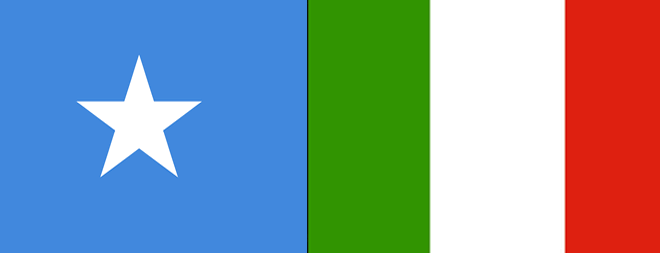
Mohammed Dhaysane
Friday January 14, 2022

When Somalia’s state-run Radio Mogadishu began airing an Italian-language program earlier this month under a new agreement with Italy, it led to an uproar.
Somalis both at home and abroad reacted with anger, calling it an attempt by Italy to influence the country and reintroduce its brutal form of colonialism.
Italy is trying to compete among Africa's former colonial countries as well as with the US, China, and India for new markets and resources on the continent, especially in the Horn of Africa, where Somalia is located. It now wants to revive its influence in Somalia, Abduwali Garad, a PhD candidate and teaching associate at the UK’s University of Birmingham, told Anadolu Agency.
He said as part of these efforts, Italy approached the Somali National University and offered some scholarships and attempted to influence learning and the teaching curriculum. It is also trying to take over the administration of Demartini Hospital in Mogadishu, which was built and controlled by the Italians during the colonial era.
"It is also worth mentioning that the Italians are dealing with some Somali politicians to make it easier to revive their influence and agendas by bribing them, especially during parliamentary elections," Garad claimed.Salah Sheik Osman, Somalia's former minister of public works and reconstruction and current chairman of the Justice and Unity party (TIIR), said it makes no sense to allow national radio to air an Italian-language program given what Italy did during its "brutal" colonial era in Somalia.
He said only people over 60 or 65 in the country may understand Italian and questioned why Somalis need the Italian language, whose use has been declining for over 30 years.
"Over 75% of our population is young and they don't understand Italian and don't want the Italian colonial language to come back," Osman said.
After Italy forcefully took over and brutally colonized the country, the first thing it did was to dismantle Somalia's traditional governance system, he said. It also destroyed Somalia's thriving economy and Somali kingdoms and city-states among the Geledi Empire, which was based in the Lower Shabelle region.
"It destroyed Somalia's culturally rich system and dismantled our kingdoms and then started to brutalize and colonize the general population," he said.
He said Italy was responsible for killing thousands of Somalis during the colonial era.
"Thousands of people who were forced to work for the Italians died from disease, hard labor, a lack of food and medicine, and beatings, for instance, in the village of Kali Asayle, where thousands died while digging a water channel in Lower Shabelle," he said.
He noted that during the Geledi Kingdom's resistance against the Italians in the late 19th and
How Italy started to take over
The Italians first came to Mogadishu and bought the Banaadir region from a ruler named Sayyid Barghash and then started to extend to the south and then to the southwest, according to Abdurahman Baadiyow, one of Somalia's foremost scholars and historians, who spoke to Anadolu Agency by phone.
"After this takeover, which was like an Italian version of the East India Company, they reached Warsheikh, where they met heavy resistance, and later Adale in Middle Shabelle, where after the resistance killed seven Italians, the Italians killed 40 Somalis," said Baadiyow, one of the founders of Mogadishu University.
He said before it destroyed Somali kingdoms and city-states, the fascist government of Benito Mussolini met with heavy resistance organized by religious students and religious scholars, since at that time, Somalis lacked effective and regular forces.
He said during the Somali resistance, Italians committed a massacre in the vicinity of Lafole – now a small town 22 kilometers (13.6 miles) southwest of the capital Mogadishu – and surrounding areas after a fierce battle.
During the fighting between Italy and Ethiopia, over 6,000 Somalis were forced to take part, and most lost their lives, he said.
On Italy’s attempt to revive its influence in Somalia, he said: "It doesn't make any sense. If it's a government policy allowing the airing of an Italian language program on state media, I believe it is a wrong and shortsighted policy.”
No interest in Italian
Moulid Hujale, a senior Somali freelance journalist, told Anadolu Agency that the reintroduction of the Italian language on Somali state radio is part of Italy’s wider geopolitical strategy, but it has been ridiculed by many Somalis.
Popularity of Turkish
Osman believes the only foreign language that is currently thriving in Somalia and in the public eye is Turkish.
"If the government wants to air a foreign language, go ahead and air Turkish on national radio because the young people are now interested in Turkish and a lot of people now can speak Turkish," he said.
He said young Somali academics were educated in Turkiye and thousands of Somali National Army personnel were trained there and can speak Turkish, and even if they may not speak fluently, they can understand and communicate in the language.